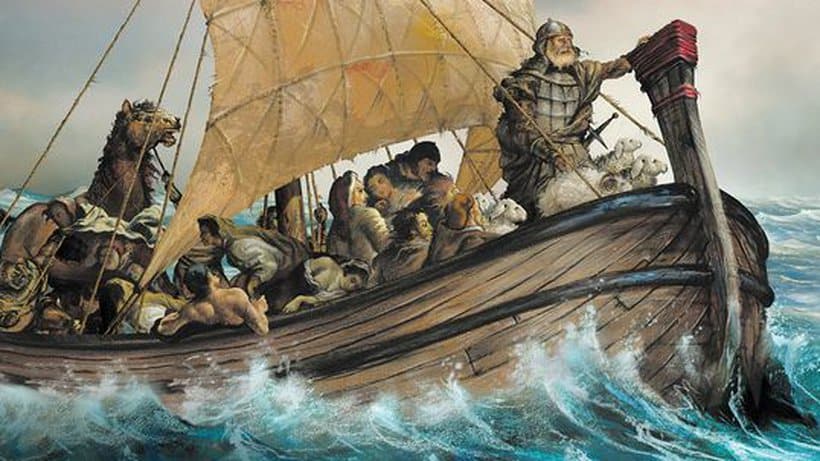The Vandals are known to have once inhabited what is contemporary Poland. Faced with the expansion of the Huns at the beginning of the 5th century AD, however, they decided to leave their existing settlements.
Aware of the Huns approaching and emboldened by the decline of the Roman Empire, an increasing number of hitherto unknown barbarian peoples resolved to abandon their existing territories in order to settle on Roman lands. The first to migrate were the Vandal tribes known as the Hasdingi and the Silings as well as the Alans (most probably the Iazyges – the Alans’ western ramification). The Suebi people also tend to be mentioned as one of the migrating tribes yet this does not find full support in historical sources. On the contrary, the records point to the Quadi people inhabiting areas of Slovakia and Moravia.
It is unclear whether the Hasdingi under their King Godegisel, the Silings and all the above mentioned tribes deserted their existing territories simultaneously or whether their unification materialised during the invasion of Gaul or just before. This notwithstanding, on the last day of the year 406, the barbarians crossed the frozen Rhine into Gaul. The Burgundians might have been yet another tribe to take part in the invasion as it is to them that Emperor Constantius III ceded the part of Gaul situated on the River Rhine in 413.
Even though the Huns did invade what is Poland today, few details of the conquest are known. Their presence is attested by archeological sources. In the village of Jakuszowice (southern Poland), a burial mound of a Hun warrior was discovered along with the gold plates of an Asian bow (probably symbolising authority exercised on someone else’s behalf). A Hunnic grave of a woman was unearthed in Jędrzychowice near Wrocław. The grave contained gold ornaments and a bronze Hunnic cauldron. In the village of Przemęczany (southern Poland), archaeologists came across a skeleton of a warrior with the skull deformed in accordance with the common Hunnic practice .
The Hunnic invasion of what is contemporary Poland might explain why the peoples living there at the time fled their settlements en masse burying treasures. In some cases, the evacuation clearly took place amid chaos and panic. In the village of Igłomia near Krakow, the fugitives left their pottery kilns unextinguished. One such kiln contained the earthenware consisting of 92 pots.
The wealthy provinces of the crumbling Imperium Romanum kept falling into the clutches of the ever-growing number of invaders. This is what St. Jerome recorded in those days:
“The entire Gaul fell prey to innumerable savage tribes. The area between the Alps and the Pyrenees as far as the Ocean and the Rhine was plundered by: the Quadi, the Vandals, the Sarmatians, the Alans, the Gepids, the Heruli, the Saxons, the Burgundians, the Alemanni and, o you wretched republic! – our foes – the Pannonians.”
As the detailed account of the conquests is beyond the scope of this publication, the author will only mention the most important events.
In 409, the Vandals, the Alans and the Suebi left Gaul for Spain, which they then divided among themselves by drawing lots. Accordingly, the Alons obtained Lusitania and Carthaginensis, the Silings received Baetica, Hasdingi gained East Gaul whereas the Suebi acquired West Gaul.
Between 416 and 418, the Silings were wiped out by the Visigoths, allied with Rome at the time. The King of the Silings, Fredebal was captured and sent to the imperial court in Ravenna. The few Silings who weathered the storm associated with the Hasdingi thus losing their original identity.
In 429 the Vandals and the Alans under the command of Gaiseric, the King of the Vandals moved to Northern Africa. In June 430 they laid siege to Hippo, which surrendered after a 14-month-long besiegement. In 432 the Emperor sent an expeditionary force to Africa, which, however, suffered a total defeat at the hands of the Vandals.
In the coming decades, the kingdom established by the Vandals in Africa played a major political role in the western part of the Mediterranean basin. The Vandals conquered a number of islands in the Mediterranean Sea including Sardinia and Corsica as well as Sicily (temporarily). In 455 they sacked Rome.
Let us take a look at the writings of Procopius of Caesarea including the information about the Vandalic envoys from Central Europe to Vandal King Gaiseric in Africa:
“The Vandals, pressed by hunger, decided to leave their lands, but a number of them stayed in the country despite Godigisclus’ encouragement.. After some time, followed by many a brave warrior, Gaiseric conquered Libya. Those who had failed to listen to Godigisculus welcomed the news as the rest of the country was thriving. Shortly afterwards, either those who conquered Libya or their descendants having returned from Libya to their own country (as they did not suspect to be tolerated on the Libyan territory by the Romans in the long run), sent envoys to those in Africa. When received by Gaiseric , the envoys asked their prospering relatives not to claim the right to their country of origin, which in view of their conquests they were no longer in need of and went on to beseech the King to grant it to them so that the daughters of the land might be more secure and the people did not hesitate to give up their lives for their homeland should the need arise. Gaiseric and the other Vandals deemed the arguments fair enough and were inclined to accept the offer. Then a wise old sage rose and said that the proposal should never be accepted. He argued that all that was human was never certain and none of those present could ever be sure what trouble lay in store for them. Upon hearing that, Gaiseric decided to decline the offer”.
Thus the Vandals who established their domain in Africa never waived the right to their country of origin. They were not destined to return there, though. Procopius of Caesarea goes on to say:
“And the Vandals who remained in their native country disappeared without a trace. I believe that due to the fact that there were very few of them, either under duress or of their own free will they mingled with the neighbouring barbarians and their name faded into oblivion.”
The article is excerpted from Wojciech Kempa’s publication, “Co przed Mieszkiem?” on the history of Polish lands prior to the baptism of Poland. The book can be purchased by clicking the link below: [https://sklep.magnapolonia.org/produkt/co-przed-mieszkiem-wojciech-kempa/]
Tłum. A. Sz.
[Wróć do tekstu w języku polskim]
Podoba Ci się to co robimy? Wesprzyj projekt Magna Polonia!






